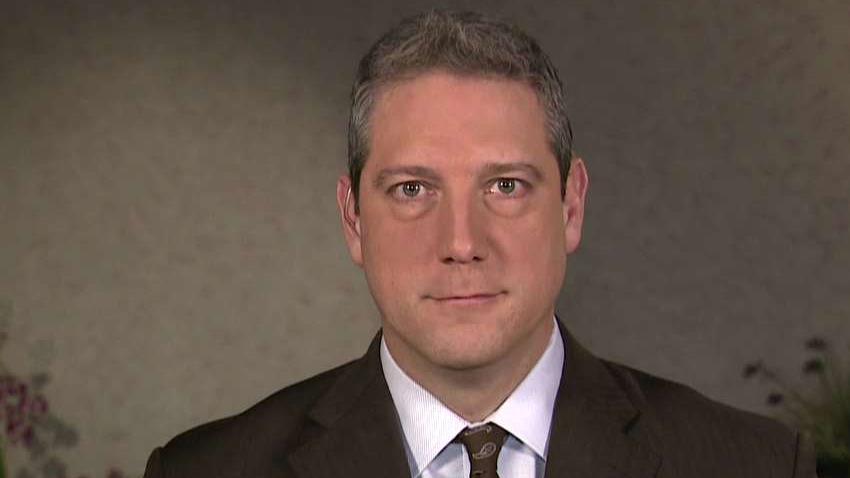ObamaCare ruling concerning, 'mistake' for country, Democratic lawmaker says
In the wake of a Texas federal judge’s ruling last week that the Affordable Care Act’s individual mandate – which requires people to buy health insurance – is unconstitutional and that the law could not remain without it, Rep. Tim Ryan said Sunday he is very concerned about the future of health coverage in the U.S.
“I represent an area that has a lot of people that work really hard, put in 40, 50 hours a week and still can’t afford health care,” Ryan, D-Ohio, said during an interview on “Sunday Morning Futures.” “And for us to lose any kind of universality or help to give these families for health care, I think, is a mistake for our country.”
The ruling, which came on the day before the signup deadline, won’t affect health care coverage right away since no injunction was filed. The case, likely to be appealed, is expected to be heard before the Supreme Court.
Ryan said the law has helped businesses and allows the nation to be competitive, and compared the individual mandate of the ACA – the signature policy of the Obama administration – to the requirement for auto insurance in the U.S.
“In many, many states there’s an individual mandate for car insurance,” he said. “That’s something that has been done all over the country to say ‘we know you’re going to get in a car accident, so you need car insurance.’ You know you’re going to get sick, so you should have to get health insurance and if you can’t afford it, we should help pay.”
Despite the incoming new Congress, where Democrats will control the House, the Ohio lawmaker doesn’t think his party and the GOP will be able to come to terms on a new health plan.
“The Republicans have voted 60 or 70 times to repeal the Affordable Care Act, so I think it would throw the health care system into a tailspin,” Ryan said. “The Affordable Care Act plan was really a Republican plan back in the day. And I hope we can come together and say every American in this wealthy country should be able to have health insurance for their kids and their families.”
Ryan also commented on the partial government shutdown that is expected to occur on Dec. 22, after President Trump and congressional Democrats have failed to reach an agreement on government funding due to a debate over the border wall separating the U.S. and Mexico.
Trump has requested $5 billion to fund the wall, while Democratic leaders have vehemently opposed the request. Senate Minority Leader Charles Schumer, D-N.Y., and House Minority Leader Nancy Pelosi, D-Calif., had a public spat with the president in the Oval Office last week over funding for the wall, and left without budging.
“President Trump should understand, there are not the votes for the wall in the House or the Senate,” Schumer, still holding firm his position, said during an interview on NBC’s “Meet the Press” on Sunday. “He is not going to get the wall in any form.”
Meanwhile, the White House is also refusing to shift its position on the wall as the deadline for the partial shutdown inches closer.
“We’re going to do whatever is necessary to build the border wall to stop this ongoing crisis of illegal immigration,” White House senior adviser Stephen Miller said Sunday during an interview on CBS’ “Face the Nation.” In response to a follow up question on whether the administration would shut down the government if a deal is not reached, Miller said: “if it comes to it, absolutely. This is a very fundamental issue.”
However, Ryan doesn’t believe the shutdown – if it were to occur – would have a major impact on the country, though it displays “the dysfunction in Washington.”
“We’ve got to figure out how to come together here around some basic budgets,” he said. “We believe in border security, I believe in border security. We have technologies today that would far surpass a wall. This is not the 15th century.”
The Ohio Democrat added that the U.S. should invest in the technology, as well as more Border Patrol agents, then reach a deal on immigration reform that would provide a pathway for people who entered the country illegally to obtain citizenship.
“Let’s find a pathway for people to pay a fine, pay their back taxes, learn English if they don’t already know it and come into the country in the next six, seven years and start paying taxes and contributing to Social Security and Medicare and the economy and all of these things. That’s a good deal for everybody.”




















